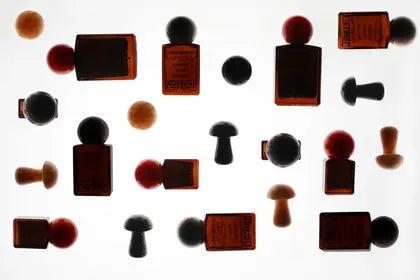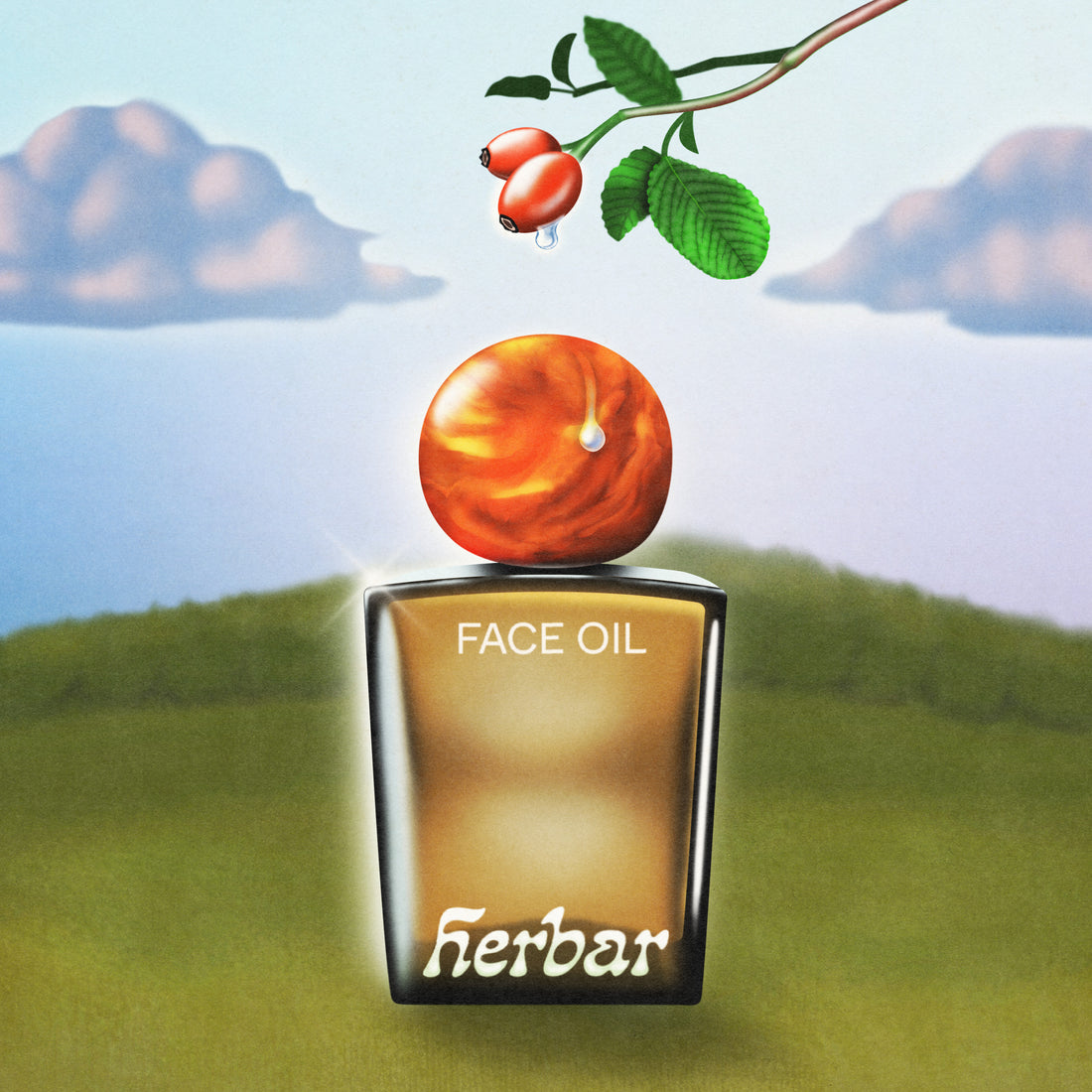Incorporating face oil into your skincare routine can dramatically transform both the health and appearance of your skin.
Far from the common misconception that oils make your skin oily, the right face oils can be a boon, providing essential nourishment, protecting the skin barrier, and giving you a radiant complexion. Herbar's first product—face oil—focuses on a potent blend that includes ingredients such as bakuchiol, hemp seed oil, reishi and tremella extracts, vitamin E, rosehip extract, and Asian jujube extract.
Herbar Face Oil consists of concentrated blends that deliver powerful plant extracts and nutrients directly to your skin. Unlike traditional moisturizers that may contain waxes and water, face oils are purer and provide a direct hit of hydration and nutrients. They are designed to be absorbed quickly, penetrating deeply to work their magic without leaving a greasy residue.
Key Ingredients & Their Benefits-
Bakuchiol: Recognized as a natural alternative to retinol, bakuchiol facilitates the upregulation of types I and IV collagen and also stimulates type III collagen, effectively reducing wrinkles and fine lines without the irritation commonly associated with retinol.
Additionally, bakuchiol shows promise as a new agent that can complement and enhance the effectiveness of current anti-acne formulations by down-regulating the enzyme 5-α-reductase, which is responsible for converting testosterone to DHT. This conversion leads to excessive oil production and acne. By inhibiting 5-α-reductase, bakuchiol helps prevent the formation of acne (Ratan K Chaudhuri and Marchio 2011). -
Hemp Seed Oil: Rich in omega fatty acids, hemp seed oil is well-suited for most skin types as it hydrates without clogging pores.
The oil's fatty acid composition closely mirrors the skin’s natural lipids, which allows it to replenish the skin effectively. It acts as an anti-inflammatory agent and helps compensate for lower ceramide levels in the skin, thus enhancing moisture retention and reducing signs of aging or inflammation.
Hemp seed oil contains numerous essential fatty acids and nutrients that aid in the production of keratin which plays a crucial role in forming the outer layer of the skin. Due to its high-performance moisturizing properties, hemp seed oil is an excellent remedy for dryness and scalp conditions, as it balances oily skin by hydrating it and regulating oil production (Baral, Bagul, and Gajbhiye 2020). - Reishi Extract: Known in traditional Asian medicine as the "mushroom of immortality," reishi has been used for thousands of years to treat various ailments, as documented in Shen Nong's Materia Medica. Reishi's triterpenoids offer hepatoprotective, anti-hypertensive, and anti-histaminic effects, significantly reducing inflammation and improving skin health. Its polysaccharides, especially beta-D-glucans, provide immune-modulating effects and protect against environmental stressors by reducing free radical damage (Leung 2002; Jong and Birmingham 1992).
-
Tremella Extract: This traditional Chinese medicinal mushroom surpasses hyaluronic acid in its water retention capabilities. It contains fungal polysaccharides, natural biological macromolecules consisting of chain polymers formed by glycosidic bonds linking monosaccharides.
The abundance of hydrophilic hydroxyl groups in these polysaccharides endows them with strong hygroscopicity, emulsification, high viscosity, and excellent film-forming properties. Specifically, the polysaccharide from Tremella is a type of mannan linked by α-(1,3) and β-(1,4) glycosidic bonds (Khondka 2009). Rich in hydroxyl and uronic acid, it boasts potent antioxidant and moisturizing properties, making it an outstanding hydrating agent that enhances skin elasticity and reduces fine lines (Yang et al. 2021). -
Vitamin E: is a lipid-soluble antioxidant that is present in the skin and found in various foods. Vitamin E protects the skin from environmental pollutants and damage from UV rays. In study, a topical application has been shown to exert photoprotective effects by reducing the number of sunburn cells, reducing ultraviolet UVB induced damage.
Newer studies suggest that the combined application of various antioxidants can increase their potency when compared with 1 antioxidant alone. Herbar face oil contains fungi and adaptogen extracts works as synergists to increase the efficacy of the formular (Ahmed et al. 2020). -
Rosehip Extract: Renowned for its rich content of vitamin C and flavonoids, rosehip extract is celebrated for its potent antioxidant properties (Tumbas et al. 2012). Topical application of vitamin C has been extensively studied both in vitro and in vivo, showcasing its effectiveness as a photoprotectant that helps prevent sun damage by reducing sunburn cells and diminishing erythema from both UVA and UVB radiation.
Additionally, ascorbate is essential for collagen synthesis, and the inclusion of ascorbic acid in skincare products has been shown to boost collagen production in human skin fibroblasts (KIVIRIKKO and MYLLYLÄ 1985). - Jujube Extract: Originating from China, Asian Jujube has been a staple in traditional Chinese medicine (TCM) and as a dietary supplement for thousands of years. Highlighted in the ancient Chinese herbal medicine text "Huangdi Neijing" (475-221 BCE) as one of the five most valuable fruits, jujube is highly regarded for its rich antioxidant and vitamin content. This extract is particularly beneficial for skin care, helping to soothe and strengthen the skin by enhancing its barrier, reducing sensitivity, and boosting resilience against environmental stressors (Agrawal et al. 2023).
Integrating face oils into your skincare routine can elevate your skincare game. Here’s how:
- Morning Routine: To expedite the process, you can quickly add a few extra drops of oil into your cream when you're in a rush in the morning. It can also act as a primer, giving your makeup a smoother, more dewy base.
- Night Routine: Layer face oil over your nighttime moisturizer to seal in moisture and active ingredients. At night, your skin repairs itself, and the extra layer of oil can help accelerate this process.
- Seasonal Changes: In the colder months, face oil can become your skin’s best friend. It provides an additional layer of protection against harsh winter air, keeping your skin plump and moisturized.
To fully harness the benefits of face oils, it’s crucial to apply them correctly:
- Cleanse First: Begin by applying face oil to clean, slightly damp skin. The existing moisture helps the oil absorb more effectively.
- Warm It Up: Heat the oil slightly by rubbing it between your palms before applying. This enhances the oil’s ability to penetrate your skin.
- Press, Don’t Rub: Instead of rubbing, gently press the oil into your skin using firm strokes. This method boosts circulation and optimizes absorption. For an enhanced experience, incorporate the Herbar Gua-shroom in this step.
- Use the Right Amount: Typically, 3-4 drops of oil are enough to cover the face without leaving excess residue.
Herbar Face Oil is an effective and enriching complement to any skincare regimen. Packed with a potent blend of natural ingredients, it offers numerous benefits from deep hydration to rejuvenation. Discover the transformative power of these botanicals and watch as your skin becomes healthier and more radiant. Share your experiences and tips on how face oils have revolutionized your skincare routine!
Reference:
Agrawal, Priya, Talever Singh, Devender Pathak, and Himansu Chopra. 2023. “Pharmacological Research - Modern Chinese Medicine An Updated Review of Ziziphus Jujube : Major Focus on Its Phytochemicals and Pharmacological Properties.” Pharmacological Research - Modern Chinese Medicine 8 (August): 100297. https://doi.org/10.1016/j.prmcm.2023.100297.
Ahmed, Idris Adewale, Maryam Abimbola Mikail, Norhisam Zamakshshari, and Al Shwyeh Hussah Abdullah. 2020. “Natural Anti-Aging Skincare: Role and Potential.” Biogerontology 21 (3): 293–310. https://doi.org/10.1007/s10522-020-09865-z.
Baral, Priyanka, Vishakha Bagul, and Swati Gajbhiye. 2020. “Hemp Seed Oil for Skin Care (Non-Drug Cannabis Sativa.” World Journal of Pharmaceutical Research 9 (8): 2534–56. https://doi.org/10.20959/wjpr20208-18346.
Boh, Bojana, Marin Berovic, Jingsong Zhang, and Lin Zhi-Bin. 2007. Ganoderma Lucidum and Its Pharmaceutically Active Compounds. Biotechnology Annual Review. Vol. 13. https://doi.org/10.1016/S1387-2656(07)13010-6.
Chaudhuri, R. K., and K. Bojanowski. 2014. “Bakuchiol: A Retinol-like Functional Compound Revealed by Gene Expression Profiling and Clinically Proven to Have Anti-Aging Effects.” International Journal of Cosmetic Science 36 (3): 221–30. https://doi.org/10.1111/ics.12117.
Chaudhuri, Ratan K, and Francois Marchio. 2011. “Bakuchiol in the Management of Acne-Affected Skin.” Cosmetics and Toiletries 126 (7): 502–10. www.CosmeticsandToiletries.com.
Khondka, Proma. 2009. “ Composition and Partial Structure Characterization of Tremella Polysaccharides .” Mycobiology 37 (4): 286. https://doi.org/10.4489/myco.2009.37.4.286.
KIVIRIKKO, KARI I., and RAILI MYLLYLÄ. 1985. “Post‐Translational Processing of Procollagens.” Annals of the New York Academy of Sciences 460 (1): 187–201. https://doi.org/10.1111/j.1749-6632.1985.tb51167.x.
Leung SWS. Lingzhi (Ganoderma) research – the past, present and future perspectives. In: Ganoderma: Genetics, Chemistry, Pharmacology and Therapeutics, Zhi-Bin Lin (ed), Proceedings of International Symposium on Ganoderma Research, Shanghai, October 21–23, Beijing, Medical University Press, 2002, pp. 1–9.
Tumbas, Vesna T., Jasna M. Čanadanović-Brunet, Dragana D. Četojević-Simin, Gordana S. Ćetković, Sonja M. Dilas, and Lars Gille. 2012. “Effect of Rosehip (Rosa Canina L.) Phytochemicals on Stable Free Radicals and Human Cancer Cells.” Journal of the Science of Food and Agriculture 92 (6): 1273–81. https://doi.org/10.1002/jsfa.4695.
Yang, Meng, Zilong Zhang, Yan He, Chengliang Li, Jinmei Wang, and Xia Ma. 2021. “Study on the Structure Characterization and Moisturizing Effect of Tremella Polysaccharide Fermented from GCMCC5.39.” Food Science and Human Wellness 10 (4): 471–79. https://doi.org/10.1016/j.fshw.2021.04.009.


